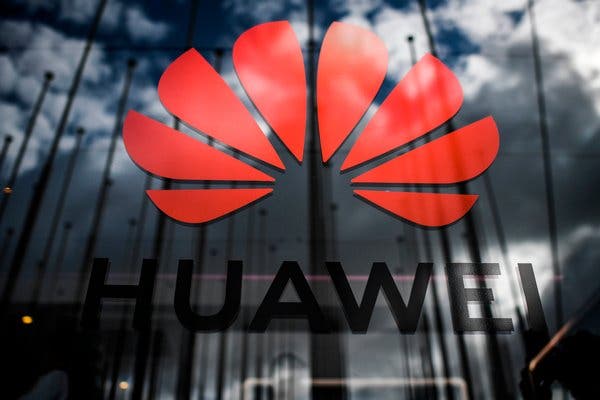WASHINGTON — This week began with the Trump administration giving Huawei, the Chinese telecom giant, a reprieve. It will most likely end with a different set of regulators voting to make it more difficult for the company to do business in America.
The Commerce Department said Monday it would extend for 90 days the license that allows companies to export goods to Huawei, despite its placement on a government blacklist that bans it from doing business with American partners.
On Friday, the Federal Communications Commission will vote on whether to ban wireless providers from buying Huawei equipment with federal subsidies meant to expand broadband access to underserved areas.
The whiplash-inducing week reflects Huawei’s tenuous position in Washington as the Trump administration, along with lawmakers from both parties, tries to cut off the company’s access to American technology and markets over national security concerns. In addition to the blacklist, which bans American companies from selling technology and other products to Huawei, policymakers have tried to stop federal agencies from doing business with the company.
The fate of Huawei — one of China’s most visible tech companies — has also become a bargaining chip in Mr. Trump’s trade war with Beijing. The president has routinely linked the company’s fate with trade talks, and his willingness to ease restrictions on Huawei in exchange for other concessions has worried China critics, who say it is unwise to mix national security and trade negotiations.
Senator Chuck Schumer of New York, the Democratic leader, said Monday that if Mr. Trump and the Commerce Department “agree that Huawei is a national security threat, they should start acting like it.”
This is the second time the Trump administration has extended the license allowing American companies to continue exporting to Huawei. The previous extension was set to expire on Monday and this next reprieve will end on Feb. 16, 2020.
The Commerce Department said a second extension was necessary to avoid service disruptions in rural areas, where some carriers use Huawei equipment.
“The Temporary General License extension will allow carriers to continue to service customers in some of the most remote areas of the United States who would otherwise be left in the dark,” Wilbur Ross, the commerce secretary, said in a statement. He said the agency would still “rigorously monitor sensitive technology exports” for national security risks.
But the extension will also benefit some large American tech companies, like Google, that supply Huawei with certain components for its products. Those companies have also urged the administration to allow firms to continue doing business with Huawei.
The temporary reprieve did little to satisfy Huawei, which has protested its inclusion on a United States “entity list” that the administration has increasingly used to block Chinese tech companies.
“Extending the Temporary General License won’t have a substantial impact on Huawei’s business either way,” a Huawei spokesman said in a statement. “This decision does not change the fact that Huawei continues to be treated unfairly.”
The Chinese company has also been pushing back on the F.C.C. measure, which would make it impossible for wireless carriers to buy equipment from Huawei or ZTE, another Chinese telecom company, using federal subsidies meant to expand broadband access.
Huawei has criticized the F.C.C. over the proposal and called it “unlawful” in a filing at the agency this month. The F.C.C. rules could grow to cover other companies that are deemed national security threats, as well.
Ajit Pai, the agency’s chairman, has said the move is crucial as America and other countries build out the next generation of wireless networks, known as 5G. The Trump administration has waged a global campaign to prevent Huawei from building that network, arguing that the company poses a national security risk because of its ties to China and new laws that will give Beijing the power to spy on networks that companies like Huawei have helped build and maintain.
Huawei has disputed those allegations and said it did not and would not spy on behalf of the Chinese government.
The F.C.C. measure has drawn support from Attorney General William Barr, who said in a Nov. 13 letter that the move could signal to other countries that they should not use gear from the companies.
“At this critical moment, while the world decides where to place its trust, we should not signal that Huawei and ZTE are anything other than a threat to our collective security,” Mr. Barr said.
Rural carriers have also pushed back on the F.C.C.’s proposal, saying in addition to restricting future network development it could make it hard to maintain existing equipment.
In some cases, rural providers have already bought Huawei gear because it is more affordable. Providers often also rely on federal subsidies to serve rural, isolated areas.
The measure that the F.C.C.’s five commissioners will vote on Friday will address only future purchases of Huawei and ZTE equipment, but it also begins an examination of an even more loaded question: What to do with the equipment that has already been installed?
Rural carriers say any requirement that they rip out existing Huawei gear could be very expensive and have called for financial support should they have to replace the equipment they’ve already purchased. A House committee will vote Tuesday on a bill that would allocate $1 billion to help carriers replace the equipment.
“We have to ensure that these smaller and more rural providers have the support they need to stay away from this equipment,” said Representative Frank Pallone, a Democrat from New Jersey who is chairman of the House’s Energy and Commerce Committee. “And I don’t think that’s going to happen unless we have a fund for replacement.”
Ana Swanson contributed reporting.







